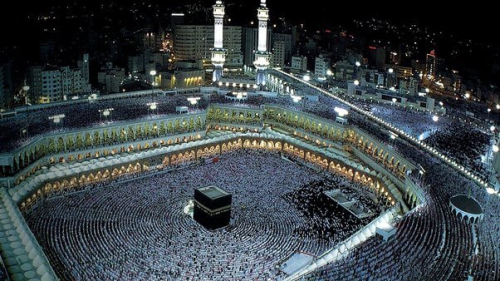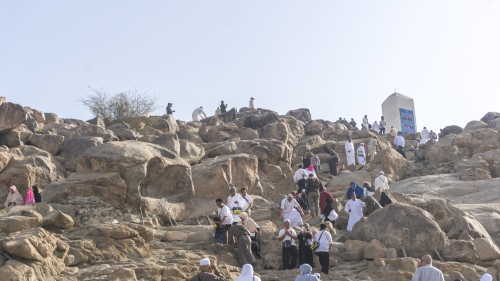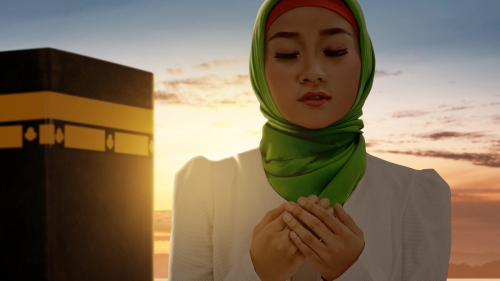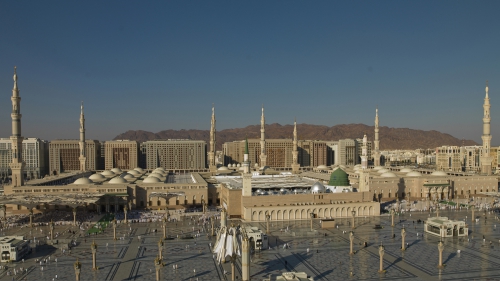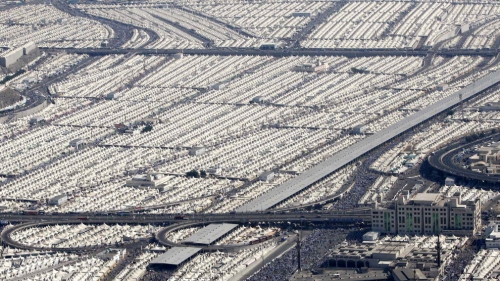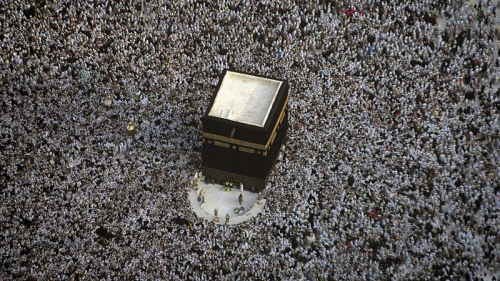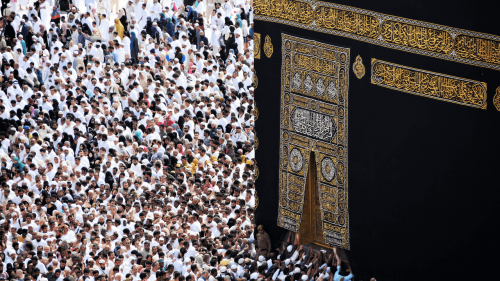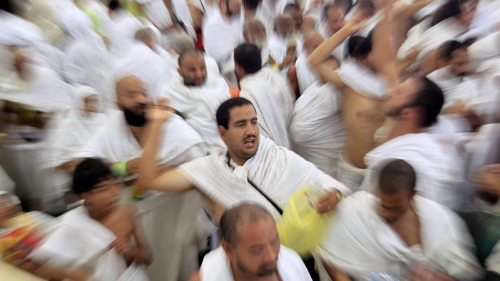Volume 1, Book 3, Number 83:
Narrated 'Abdullah bin Amr bin Al 'Aas:
Allah's Apostle stopped (for a while near the Jimar) at Mina during his last Hajj for the people and they were asking him questions. A man came and said, "I forgot and got my head shaved before slaughtering the Hadi (sacrificing animal)." The Prophet said, "There is no harm, go and do the slaughtering now." Then another person came and said, "I forgot and slaughtered (the camel) before Rami (throwing of the pebbles) at the Jamra." The Prophet said, "Do the Rami now and there is no harm."
The narrator added: So on that day, when the Prophet was asked about anything (as regards the ceremonies of Hajj) performed before or after its due time, his reply was: "Do it (now) and there is no harm."
|
Volume 1, Book 3, Number 126:
Narrated 'Abdullah bin 'Amar:
I saw the Prophet near the Jamra and the people were asking him questions (about religious problems). A man asked, "O Allah's Apostle! I have slaughtered the Hadi (animal) before doing the Rami." The Prophet replied, "Do the Rami (now) and there is no harm." Another person asked, "O Allah's Apostle! I got my head shaved before slaughtering the animal." The Prophet replied, "Do the slaughtering (now) and there is no harm." So on that day, when the Prophet was asked about anything as regards the ceremonies of Hajj performed before or after its due time his reply was, "Do it (now) and there is no harm."
|
Volume 1, Book 6, Number 313:
Narrated 'Aisha:
In the last Hajj of Allah's Apostle I assume the Ihram for Hajj along with Allah Apostle. I was one of those who intended Tamattu' (to perform Hajj an 'Umra) and did not take the Hadi (animal for sacrifice) with me. I got my menses and was not clean till the night of 'Arafa I said, "O Allah's Apostle! It is the night of the day of 'Arafat and I intended to perform the Hajj Tamattu' with 'Umra Allah's Apostle told me to undo my hair and comb it and to postpone the 'Umra. I did the same and completed the Hajj. On the night of Al-Hasba (i.e. place outside Mecca where the pilgrims go after finishing all the ceremonies Hajj at Mina) he (the Prophet ordered 'Abdur Rahman ('Aisha's brother) to take me to At-Tan'im to assume the lhram for'Umra in lieu of that of Hajj-atTamattu' which I had intended to perform.
|
Volume 2, Book 26, Number 623:
Narrated Anas bin Malik:
Allah's Apostle offered four Rakat of Zuhr prayer at Medina and we were in his company, and two Rakat of the Asr prayer at Dhul-Hulaifa and then passed the night there till it was dawn; then he rode, and when he reached Al-Baida', he praised and glorified Allah and said Takbir (i.e. Alhamdu-lillah and Subhanallah(1) and Allahu-Akbar). Then he and the people along with him recited Talbiya with the intention of performing Hajj and Umra. When we reached (Mecca) he ordered us to finish the lhram (after performing the Umra) (only those who had no Hadi (animal for sacrifice) with them were asked to do so) till the day of Tarwiya that is 8th Dhul-Hijja when they assumed Ihram for Hajj. The Prophet sacrificed many camels (slaughtering them) with his own hands while standing. While Allah's Apostle was in Medina he sacrificed two horned rams black and white in color in the Name of Allah."
|
Volume 2, Book 26, Number 703:
Narrated Nafi':
'Abdullah bin 'Abdullah bin 'Umar and his riding animal entered the house of Ibn 'Umar. He (the son of Ibn 'Umar) said, "I fear that this year a battle might take place between the people and you might be prevented from going to the Ka'ba. I suggest that you should stay here." Ibn Umar said, "Once Allah's Apostle set out for the pilgrimage, and the pagans of Quraish intervened between him and the Ka'ba. So, if the people intervened between me and the Ka'ba, I would do the same as Allah's Apostle had done . . . "Verily, in Allah's Apostle you have a good example." Then he added, "I make you a witness that I have intended to perform Hajj along with 'Umra." After arriving at Mecca, Ibn 'Umar performed one Tawaf only (between Safa and Marwa).
|
Volume 3, Book 27, Number 11:
Narrated Aisha:
We set out along with Allah's Apostle shortly before the appearance of the new moon (crescent) of the month of Dhi-l-Hijja and he said to us, "Whoever wants to assume Ihram for Hajj may do so; and whoever wants to assume Ihram for 'Umra may do so. Hadn't I brought the Hadi (animal for sacrificing) (with me), I would have assumed Ihram for 'Umra." ('Aisha added,): So some of us assumed Ihram for 'Umra while the others for Hajj. I was amongst those who assumed Ihram for 'Umra. The day of 'Arafat approached and I was still menstruating. I complained to the Prophet (about that) and he said, "Abandon your 'Umra, undo and comb your hair, and assume Ihram for Hajj;." When it was the night of Hasba, he sent 'Abdur Rahman with me to At-Tan'im and I assumed Ihram for 'Umra (and performed it) in lieu of my missed 'Umra.
|
Volume 4, Book 52, Number 201:
Narrated 'Aisha:
We set out in the company of Allah's Apostle five days before the end of Dhul Qa'da intending to perform Hajj only. When we approached Mecca Allah's Apostle ordered those who did not have the Hadi (i.e. an animal for sacrifice) with them, to perform the Tawaf around the Ka'ba, and between Safa and Marwa and then finish their Ihram. Beef was brought to us on the day of (i.e. the days of slaughtering) and I asked, "What is this?" Somebody said, Allah's Apostle has slaughtered (a cow) on behalf of his wives."
|
Volume 4, Book 52, Number 227:
Narrated Aisha:
That she said, "O Allah's Apostle! Your companions are returning with the reward of both Hajj and 'Umra, while I am returning with (the reward of) Hajj only." He said to her, "Go, and let 'Abdur-Rahman (i.e. your brother) make you sit behind him (on the animal)." So, he ordered 'AbdurRahman to let her perform 'Umra from Al-Tan'im. Then the Prophet waited for her at the higher region of Mecca till she returned.
|
Volume 4, Book 52, Number 229:
Narrated Anas:
I was riding behind Abu Talha (on the same) riding animal) and (the Prophet's companions) were reciting Talbiya aloud for both Hajj and 'Umra.
|
Volume 5, Book 59, Number 682:
Narrated Ibn Abbas:
A woman from the tribe of Khath'am asked for the verdict of Allah's Apostle (regarding something) during Hajjat-ul-Wada' while Al-Fadl bin 'Abbas was the companion-rider behind Allah's Apostle. She asked, "Allah's ordained obligation (i.e. compulsory Hajj) enjoined on His slaves has become due on my old father who cannot sit firmly on the riding animal. Will it be sufficient if I perform the Hajj on his behalf?" He said, "Yes."
|
Volume 6, Book 60, Number 46:
Narrated Ibn 'Abbas:
A man who wants to perform the Hajj (from Mecca) can perform the Tawaf around the Ka'ba as long as he is not in the state of Ihram till he assumes the Ihram for Hajj. Then, if he rides and proceeds to 'Arafat, he should take a Hadi (i.e. animal for sacrifice), either a camel or a cow or a sheep, whatever he can afford; but if he cannot afford it, he should fast for three days during the Hajj before the day of 'Arafat, but if the third day of his fasting happens to be the day of 'Arafat (i.e. 9th of Dhul-Hijja) then it is no sin for him (to fast on it). Then he should proceed to 'Arafat and stay there from the time of the 'Asr prayer till darkness falls. Then the pilgrims should proceed from 'Arafat, and when they have departed from it, they reach Jam' (i.e. Al-Muzdalifa) where they ask Allah to help them to be righteous and dutiful to Him, and there they remember Allah greatly or say Takbir (i.e. Allah is Greater) and Tahlil (i.e. None has the right to be worshipped but Allah) repeatedly before dawn breaks. Then, after offering the morning (Fajr) prayer you should pass on (to Mina) for the people used to do so and Allah said:--
"Then depart from the place whence all the people depart. And ask for Allah's Forgiveness. Truly! Allah is Oft-Forgiving, Most Merciful." (2.199) Then you should go on doing so till you throw pebbles over the Jamra.
|
Volume 8, Book 74, Number 247:
Narrated 'Abdullah bin 'Abbas:
Al-Fadl bin 'Abbas rode behind the Prophet as his companion rider on the back portion of his she camel on the Day of Nahr (slaughtering of sacrifice, 10th Dhul-Hijja) and Al-Fadl was a handsome man. The Prophet stopped to give the people verdicts. In the meantime, a beautiful woman From the tribe of Khath'am came, asking the verdict of Allah's Apostle. Al-Fadl started looking at her as her beauty attracted him. The Prophet looked behind while Al-Fadl was looking at her; so the Prophet held out his hand backwards and caught the chin of Al-Fadl and turned his face (to the owner sides in order that he should not gaze at her. She said, "O Allah's Apostle! The obligation of Performing Hajj enjoined by Allah on His worshipers, has become due (compulsory) on my father who is an old man and who cannot sit firmly on the riding animal. Will it be sufficient that I perform Hajj on his behalf?" He said, "Yes."
|







